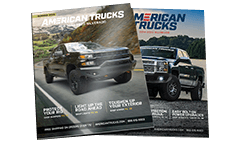
Suspension Systems FAQ
1. Should I lift or lower my vehicle?
There's a big difference between the benefits of lifting your vehicle and lowering it. If you want the freedom to pull off the beaten path and charge over untamed backcountry trails, then a lift kit is right for you. It gives you the towering ground clearance and heavy-duty chassis components you need to brave those less traveled roads. If you are more interested in unleashing your vehicle's intense handling performance on the pavements, then a lowering kit is the way to go. By dropping your center of gravity and tightening up your springs, lowering kits enhance your steering, cornering, and traction.
Of course, lift kits and lowering kits do more than just alter your vehicle's height. The shift in stature transforms the look and attitude of your ride. Going tall tends to give rigs a more domineering appearance, while deep slams give autos a sleek, custom look. If you're more interested in style than performance, get a lift or lowering kit that matches your personality and tastes.
2. Do I need an alignment after I install a lift or lowering kit?
While not all lift and lowering kits require an immediate alignment, it is a good idea to have one done anyways. Tinkering around with your vehicle's steering components, center of gravity, and suspension parts can throw everything out of balance. And, when your vehicle is out of alignment, your tires wear out faster, your fuel economy suffers, and your handling can be dangerously unpredictable.
3. Does lifting my vehicle affect its handling, steering, or braking?
In a word, yes. Lift kits radically transform how your vehicle drives, both off-road and on. You will need to spend some time reacquainting yourself with your rig after your lift is installed. Start off slow, navigating around familiar terrain like your neighborhood. Then, after you start to feel more comfortable, pick up the pace and head out on the highway.
A couple of key things to watch out for are cornering speeds and brake time. Lifting your vehicle raises your center of gravity, which makes you more susceptible to rollovers. You'll need to ease off your throttle when going around bends and avoid sharp turns. Plus, it will take more time to stop your vehicle after you've installed taller tires and heavier wheels. The safest thing to do is upgrade your rotors with a big brake kit, which boosts your braking leverage to compensate for oversized wheels and tires. Or, you can simply start braking earlier and leave more room between yourself and the people in front of you.
4. Why do most lift kits raise the front more than the rear?
It is quite common for a lift kit to raise the back-end more than the front because most pickups come from the factory with a taller tail. This profile, called a forward rake, is intentional. The rear is higher to compensate for the sag created when the bed is fully loaded with cargo. Because most people lift their vehicles for performance and style instead of towing and hauling capabilities, the majority of lifts level out this forward rake.
5. What is camber?
Don't let its mysterious, foreign name scare you-camber is an easy automotive concept to grasp. It simply refers to the angle of your wheel when viewed straight on. If the top of the wheel is tilted inwards, towards the vehicle, that is called negative camber. When the wheel is angled away from the vehicle, it is called positive camber. Ideally, the 2 wheels should have the same camber because mixed camber can cause uneven tire wear and poor handling.
6. Can't I simply cut my stock springs to lower my vehicle?
Absolutely not! Slicing a coil or 2 off of a spring is extremely ill-advised and dangerous because it dramatically alters the spring's pre-load and ability to respond to road conditions. More than likely, you'll find yourself bottoming out after every bump, and you may even lose control of your vehicle. The only safe and effective way to step down your vehicle's ride height is with new springs and the extra components that go with them. Period.
7. If I slam my vehicle down as far as it will go, will it drive more like a racecar?
Lowering your vehicle does indeed improve your handling and cornering. As you go down further, though, your suspension travel steadily decreases. And, when you have limited suspension travel, your ride feels harsher, is likely to skip over bumps, and is more likely to bottom out. Thankfully, our lowering kits are custom-engineered to bring your vehicle down to the ideal height for sporty handling, comfortable ride quality, and smoking style.
8. How do I get rid of that annoying wheel shimmy?
Besides snapped axles and blown head gaskets, there's nothing more obnoxious than wheel shimmy. There are a number of things that can contribute to this automotive malady, including misalignment, altered steering geometry, and extra weight from bigger tires and snow plows. Boosting your vehicle with a lift kit and larger wheels often causes this problem, and there is an easy solution. Steering stabilizers dampen the shimmy for a smoother, more stable ride.
9. Are lift and lowering kits easy to install?
Easy is a relative term. Lift and lowering kits may be easy for a seasoned wrench head but impossibly difficult for someone who doesn't even feel comfortable around a screwdriver. In general, though, lift and lowering kits are difficult, time-consuming, and require a number of specialty tools and equipment. AmericanTrucks recommends that you take your lift or lowering kit to a professional garage for the best possible results. However, these kits can be installed at home by people with plenty of experience and more than a little bit of mechanical know-how.
10. Will lifting or lowering my vehicle affect my warranty?
According to the Magnuson Moss Warranty Act, installing aftermarket parts onto your vehicle does not void your warranty unless the dealer can prove that the part directly caused or contributed to any vehicle failures. In principle, lifting and lowering your vehicle does not automatically invalidate your warranty. However, there are always loopholes and gray areas in the law. Before you make any modifications to your suspension, be sure to reread your warranty and talk with your dealer.
11. Which shocks are better: twin-tube or monotube?
The general rule of thumb is that monotube shocks are better for heavyweight lifted rigs, and twin-tube shocks are great for everything else. Monotubes are ideal for off-roading because of their extra firm dampening and extreme resistance to shock fade. However, monotubes have a longer travel range than twin-tubes, so they often do not fit onto vehicles without a large lift. Also, they are firmer than twin-tubes, so they create a harsher ride during street cruising.
On the other hand, twin-tubes are the gold standard for all-around performance both on smooth pavement and rough paths alike. They fit onto lifted, lowered, and stock-height vehicles, and most offer multi-stage valving for a comfortable ride under varying conditions.
12. What is shock fade and how do I avoid it?
Shock fade is a pesky problem that affects dampeners under extreme conditions. Every shock has some type of viscous oil inside that provides hydraulic resistance and absorbs heat. Prolonged use under grueling circumstances can cause the oil to overheat and thin out. This change in viscosity means that the shock does not perform at its optimal level, and your ride quality suffers as a result.
You can avoid shock fade in a number of ways. Using robust shocks that are designed for off-roading is the best way to steer clear of fade. Monotubes are better, but most twin-tubes offer plenty of fade resistance. Also, you can upgrade to shocks with oil reservoirs. This extra buffer helps to keep temperatures in your tubes in check.
13. What if I've read through all the information, but I'm not sure which lift kit, lowering kit, or shocks are right for my vehicle?
We are presenting you with a large dose of information, so it's understandable if you're feeling a bit dazed by it. You are in luck, though. We have a cure for information overload: give us a call. One of our knowledgeable Automotive Accessory Specialists is standing by to help you select the perfect suspension components for your vehicle.


